
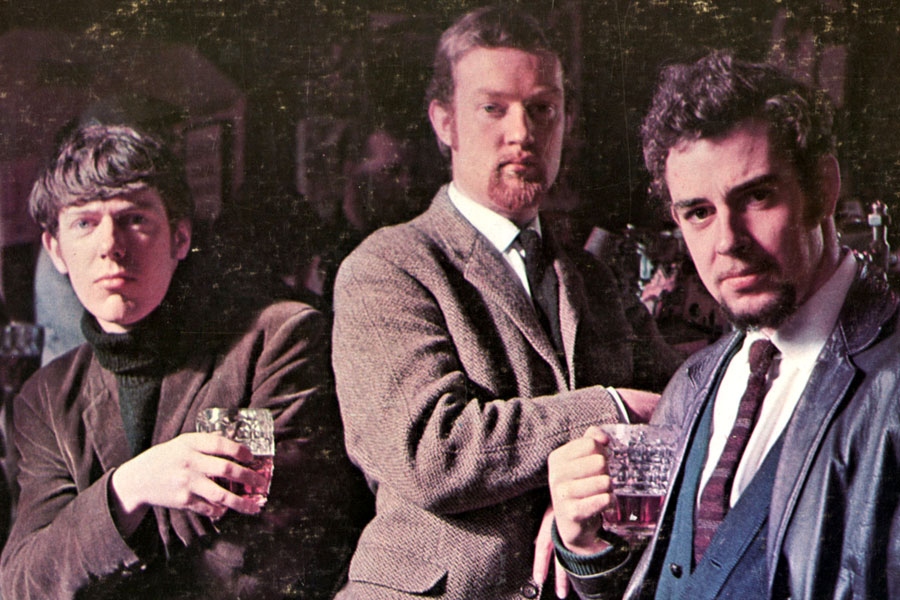
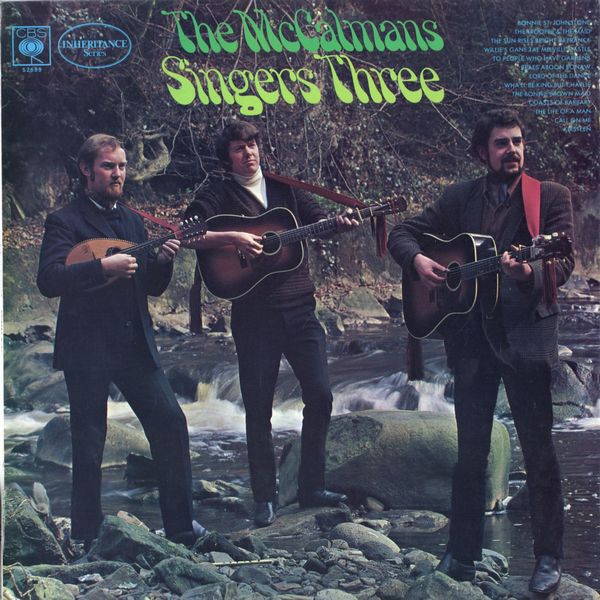 |
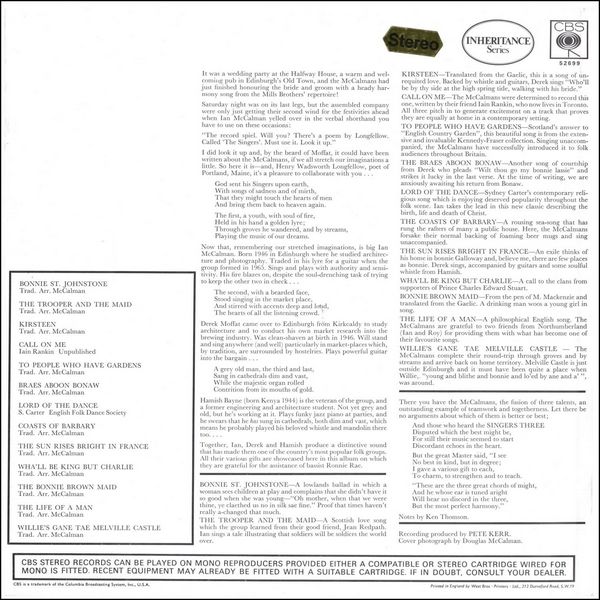
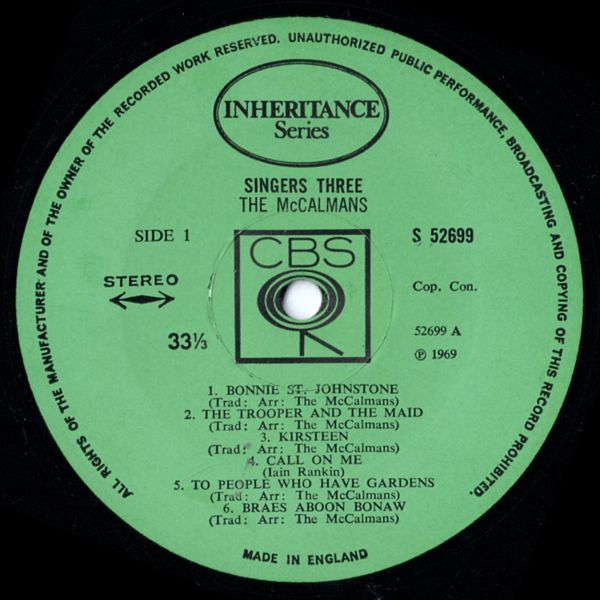
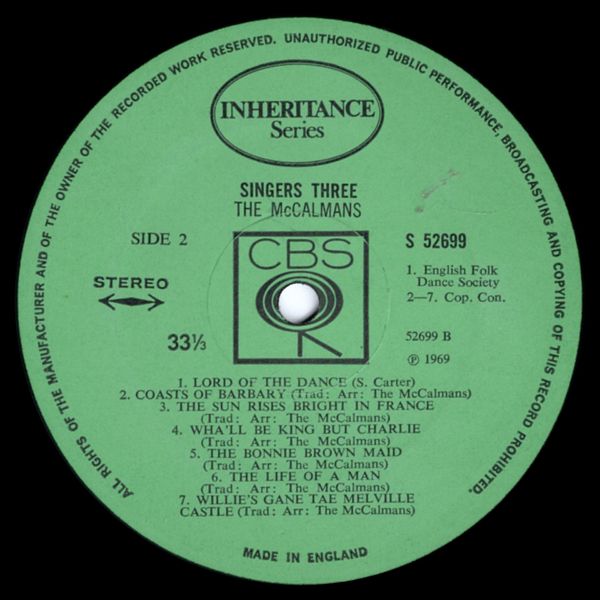
|
Sleeve Notes
It was a wedding party at the Halfway House, a warm and welcoming pub in Edinburgh's Old Town, and the McCalmans had just finished honouring the bride and groom with a heady harmony song from the Mills Brothers' repertoire!
Saturday night was on its last legs, but the assembled company were only just getting their second wind for the festivities ahead when Ian McCalman yelled over in the verbal shorthand you have to use on these ccasions:
"The record spiel. Will you? There's a poem by Longfellow. Called 'The Singers'. Must use it. Look it up."
I did look it up and, by the beard of Moffat, it could have been written about the McCalmans, if we all stretch our imaginations a little. So here it is — and, Henry Wadsworth Longfellow, poet of Portland, Maine, it's a pleasure to collaborate with you . . .
God sent his Singers upon earth,
With songs of sadness and of mirth,
That they might touch the hearts of men
And bring them back to heaven again.
The first, a youth, with soul of fire,
Held in his hand a golden lyre;
Through groves he wandered, and by streams,
Playing the music of our dreams.
Now that, remembering our stretched imaginations, is big Ian McCalman. Born 1946 in Edinburgh where he studied architecture and photography. Traded in his lyre for a guitar when the group formed in 1965. Sings and plays with authority and sensitivity. His fire blazes on, despite the soul-drenching task of trying to keep the other two in check . . .
The second, with a bearded face,
Stood singing in the market place,
And stirred with accents deep and loud,
The hearts of all the listening crowd.
Derek Moffat came over to Edinburgh from Kirkcaldy to study architecture and to conduct his own market research into the brewing industry. Was clean-shaven at birth in 1946. Will stand and sing anywhere (and well) particularly in market-places which, by tradition, are surrounded by hostelries. Plays powerful guitar into the bargain . . .
A grey old man, the third and last,
Sang in cathedrals dim and vast,
While the majestic organ rolled
Contrition from its mouths of gold.
Hamish Bayne (born Kenya 1944) is the veteran of the group, and a former engineering and architecture student. Not yet grey and old, but he's working at it. Plays funky jazz piano at parties, and he swears that he has sung in cathedrals, both dim and vast, which means he probably played his beloved whistle and mandolin there too. . . .
Together, Ian, Derek and Hamish produce a distinctive sound that has made them one of the country's most popular folk groups. All their various gifts are showcased here in this -album on which they are grateful for the assistance of bassist Ronnie Rae.
BONNIE ST. JOHNSTONE — A lowlands ballad in which a woman sees children at play and complains that she didn't have it so good when she was young — "Oh mother, when that we were thine, ye claethed us no in silk sae fine." Proof that times haven't really a-changed that much.
THE TROOPER AND THE MAID — A Scottish love song which the group learned from their good friend, Jean Redpath. Ian sings a tale illustrating that soldiers will be soldiers the world over.
KIRSTEEN — Translated from the Gaelic, this is a song of unrequited love. Backed by whistle and guitars, Derek sings "Who'll be by thy side at the high spring tide, walking with his bride."
CALL ON ME — The McCalmans were determined to record this one, written by their friend lain Rankin, who now lives in Toronto. All three pitch in to generate excitement on a track that proves they are equally at home in a contemporary setting.
TO PEOPLE WHO HAVE GARDENS — Scotland's answer to "English Country Garden", this beautiful song is from the extensive and invaluable Kennedy-Eraser collection. Singing unaccompanied, the McCalmans have successfully introduced it to folk audiences throughout Britain.
THE BRAES ABOON BONAW — Another song of courtship from Derek who pleads "Wilt thou go my bonnie lassie" and strikes it lucky in the last verse. At the time of writing, we are anxiously awaiting his return from Bonaw.
LORD OF THE DANCE — Sydney Carter's contemporary religious song which is enjoying deserved popularity throughout the folk scene. Ian takes the lead in this new classic describing the birth, life and death of Christ.
THE COASTS OF BARBARY — A rousing sea-song that has rung the rafters of many a public house. Here, the McCalmans forsake their normal backing of foaming beer mugs and sing unaccompanied.
THE SUN RISES BRIGHT IN FRANCE — An exile thinks of his home in bonnie Galloway and, believe me, there are few places as bonnie. Derek sings, accompanied by guitars and some soulful whistle from Hamish.
WHA'LL BE KING BUT CHARLIE — A call to the clans from supporters of Prince Charles Edward Stuart.
BONNIE BROWN MAID — From the pen of M. Mackenzie and translated from the Gaelic. A drinking man woos a young girl in song.
THE LIFE OF A MAN — A philosophical English song. The McCalmans are grateful to two friends from Northumberland (Ian and Roy) for providing them with what has become one of their favourite songs.
WILLIE'S GANE TAE MELVILLE CASTLE — The McCalmans complete their round-trip through groves and by streams and arrive back on home territory. Melville Castle is just outside Edinburgh and it must have been quite a place when Willie, young and blithe and bonnie and lo'ed by ane and a', was around.
There you have the McCalmans, the fusion of three talents, an outstanding example of teamwork and togetherness. Let there be no arguments about which of them is better or best;
And those who heard the SINGERS THREE
Disputed which the best might be,
For still their music seemed to start
Discordant echoes in the heart.
But the great Master said, "I see
No best in kind, but in degree;
I gave a various gift to each,
To charm, to strengthen and to teach.
"These are the three great chords of might,
And he whose ear is tuned aright
Will hear no discord in the three,
But the most perfect harmony."